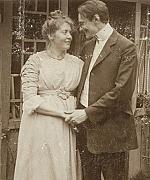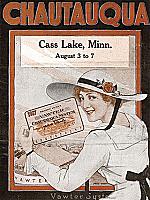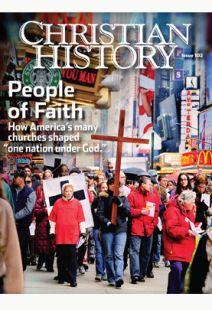Crusades and reformers
CHRISTIAN HISTORY'S Chris Armstrong sat down for a discussion of how Christianity in America has been socially engaged; his conversation partners were Randall Ballmer (Professor of American Religious History, Barnard College, Columbia University); Dana Dillon (Assistant Professor of Theology, Providence College); and Jennifer Graber (Assistant Professor, Department of Religious Studies, The College of Wooster).
CA: The rise of the “religious right” and the recent activities of religious “progressives” in politics are often perceived as representing a new development. Is that accurate?
JG: I would say not. But it is much more partisan now. In the past, there was political involvement, but people didn’t necessarily align themselves with a party and work for that party’s success. Especially in the nineteenth century, reformers convinced people in political parties to take up similar platforms.
I think there have been watershed moments. Abolishing the slave trade was one. Court rulings have made certain religious groups feel particular parties have their best interests at heart. But these are always very complicated relationships. The political parties may have some of the religious reformers’ interests in mind, but not other interests.
DD: The issues rallying Catholics in the past, particularly in the early twentieth century, were workers’ rights. That caused a lot of natural affiliation with what became the Democratic Party. But 1973 [Roe v. Wade] marks a very obvious divide for Catholics. Then those workers’ rights, which included women’s rights, became reproductive rights.
After that, I think that the Republican Party gave lip service toward restoring family values and moral issues in ways that touched chords for Catholics. The Democratic Party has done a great job with other issues that touch chords for Catholics. But that’s more driven by how the partisan system works than by the beliefs of Catholics or of Christians in general.
RB: The religious right became a distinct political movement in the late 1970s, although you see hints as far back as the 1930s. The catalyst for evangelicals was not Roe v. Wade. The Southern Baptist Convention had passed a resolution calling for the legalization of abortion in 1971, reaffirmed in 1974 and 1976. Several evangelicals applauded Roe as marking an appropriate distinction between personal morality and public policy. By the late 1970s, however, due to the Internal Revenue Service’s issues with racial segregation at Bob Jones University, as well as Anita Bryant’s crusade against gay equality in Miami Dade County, evangelicals began to mobilize.
The release of the Whatever Happened to the Human Race? film series (1979) awakened evangelicals to the abortion issue, which they previously had regarded as a Catholic concern.
CA: What lessons can Christians learn from past attempts by believers to impact the political arena and implement social reforms? Are there particular mistakes and attitudes we should seek to avoid?
JG: Social reform movements in the early nineteenth century assumed there would be much more cooperation than conflict when religious folks and political leaders got together. This was because some of the issues and institutions that reformers cared most about, for example slavery, were transformed in this period.
Yet these were actually very controversial battles. Reformers constantly faced the ways the broader American public did not share their ideas. People involved in these movements wanted to change legislation and got themselves into very messy partnerships. They would go in with a sense they were fighting for the greater good, but it became morally complicated. For example, Christians who had great intentions of making prisons very humane institutions suddenly found themselves as partners, and workers, in places where people were essentially being tortured. This paradox between wanting to be effective and also to be a witness has been hard to manage. Even having the insight to understand the paradox has sometimes been lacking.
DD: As a Catholic, it’s very hard to let go of the idea that people are responsible to account for a universal morality. The purpose of government is to order all things in society to the common good. That means that Catholics want to help Catholic citizens, and all citizens, to advocate and take responsibility for that—and hold the government accountable to doing that. I have sympathies with that, but if that aim ends up forming and shaping Catholic identity as a church, it undercuts our ability to speak about our more particular brand of Christianity, even to ourselves, and I think that’s a mistake. Even in the recent government decision to require Catholic hospitals to provide contraception, Catholics don’t know how to speak to themselves, to one another, and to the broader culture about these issues.
RB: What’s often forgotten in the religious right’s rush to remake the political arena in its image is the danger of collusion between church and state. Roger Williams recognized this almost four centuries ago. Williams wanted to protect the “garden of the church” from the “wilderness of the world” by means of a “wall of separation.”
The Puritans did not share our post-Thoreau, Sierra Club romantic notions about wilderness. For them, the wilderness was a place of danger, where evil lurked. So Williams means he wants to guard the integrity of faith from too close an association with the state.
For admittedly different motives, Thomas Jefferson picked up on that language. Jefferson wanted to protect the government from religious division. The First Amendment’s separation of church and state has ensured both political stability (Jefferson) and a vibrant, healthy religious marketplace (Williams) unmatched anywhere in the world.
But let me offer an example of Williams’s concerns. I was one of the expert witnesses in the Alabama Ten Commandments case when Roy Moore plopped a twoand-a-half-ton granite monument emblazoned with the Ten Commandments into the lobby of the judicial building in Montgomery and refused to post any other religious sentiments or principles in that space. When Judge Myron Thompson ruled, correctly, that Moore’s actions violated the Establishment Clause of the First Amendment, one of the religious right protesters screamed, “Get your hands off my God!”
Now one of the commandments etched into that monument says something about graven images. And that was precisely Roger Williams’s point about trivializing the faith by too close an association with the state.
CA: On average, would you argue that the church has been a greater force for change or for preserving the American status quo?
JG: Status quo, absolutely. Religious activists for social change are the exception rather than the rule.
DD: Status quo overall. But for Catholics, there is a bit of a pendulum swing. The Catholic Church in the United States has tended to see itself as an outsider who had to prove its loyalty to America. Only after the election of JFK did Catholics begin to think of themselves as part of the American establishment, and then, still somewhat distantly.
I think the U.S. bishops’ encyclicals on war and the economy in the 1980s began a new engagement of Catholic leadership with U.S. political life. Issues with the Obama administration on health care and their opposition to the HHS policy mandating coverage of contraceptives is another such moment where we see a refusal to go along with the status quo. Whether it will be effective is another question.
CA: Who is on your short list of the most important reformers in American Christianity?
JG: Martin Luther King, Jr. But we shouldn’t overlook other civil rights activists who made the movement work in local communities, people like Fred Shuttlesworth and Fannie Lou Hamer.
DD: For me, no one looms larger than Dorothy Day. These days, many people take it for granted that, if you are Christian, you should be committed to Christ in “the least of these,” along the lines called for in Matthew 25.
But Dorothy Day not only lived that personally, she also cofounded the Catholic Worker Movement with Peter Maurin, making communities available for others who wanted to try that way of living. She and the Catholic Workers went on to challenge the structures that lead to poverty, and she served as a real prophetic voice, calling others, including leaders of the church, to give the poor their due.
RB: I’d include Charles Grandison Finney and Jonathan Blanchard, the abolitionist founder of Wheaton College. Louis Dwight, a member of the Boston Prison Discipline Society, helped to introduce the notion of prison as a place to be rehabilitated (prisons are called penitentiaries, from “penance”). Frances Willard, head of the Woman’s Christian Temperance Union, addressed the desperate social problem of alcohol. William Jennings Bryan, three-time Democratic nominee for president, is unfairly remembered for his less-than stellar performance at the Scopes trial, but he would line up on the left of the political spectrum, especially in his support for women’s rights and labor reform. In the twentieth century, I’d put names like Jim Wallis and Tony Campolo on that list, along with Nancy Hardesty, Mark Hatfield, and Jimmy Carter.
CA: What do you think will be the most important cultural or political issue engaging American Christians in the coming decade?
JG: It ought to be economics, but we’ll continue to be consumed by sexuality. The sexuality conversation is important because it has to do with the well-being and civil rights of many Americans. Even so, as a person who studies the nineteenth century, I’m always shocked to see how concern and activism about poverty takes a back seat to other issues.
DD: Political forces are going to push conversations about same-sex marriage and contraception. The history of church control on these issues does not sit well with the modern sense of individual freedom. However, there is more at stake than making allowances for individuals who want to choose these things. There is a push for requiring everyone to acknowledge new definitions of marriage and to provide contraceptive coverage. Although these issues seem to be primarily about sex, they also touch on economic realities of marriage, children, and families in our society as well as on fundamental political issues such as the freedom of religion and the freedom of conscience.
CA: What is the relationship of social engagement and politics?
RB: People of faith have every right to bring their religious convictions into the arena of public discourse. The public sphere would be impoverished without those voices. At the same time, we must remember to observe the rules of civil discourse in a pluralistic society.
Too often, evangelicals have succumbed to the lure of “majoritarianism,” which is the idea that if I can simply muster a majority I can impose my vision of morality on everyone else. That violates both the letter and the spirit of American democracy.
DD: I believe that (as Stanley Hauerwas would say) “the first task of the Church is to be the Church.” In more Catholic terms, the church has received both a revelation and a mission from Christ. This puts it in service of the good of all and the good of each, but that good is always understood in light of the truth revealed in Christ. Christ, not American political life, is the measure of the church’s political engagements.
CA: What are high-water and low-water marks of Christian social engagement in American history? Does the list change depending on where you are coming from?
JG: I think low points are the silence about lynching in the late nineteenth and early twentieth centuries, as well as the lack of welcome of European Jews during the Holocaust by both the U.S. government and the church leaders who had politicians’ ears.
It’s interesting that you ask about where you are coming from. I think the issues should be determined by looking at Jesus’ work with suffering and marginal people. I think that where you are coming from typically matters in an unhelpful way.
For middle-class folks to assist an impoverished family has historically meant a patronizing relationship between giver and receiver. So maybe the question ought to be, How does the person in the “helper” or “advocate” position learn to listen to the person he or she is trying to help or advocate for? A little Gospel reading can help here.
CA: What are the top social issues that should concern the modern church?
RB: Jesus told his followers to care for “the least of these.” I find it difficult to evade our collective responsibility for those on the margins of society. This concern animated evangelical social reformers in the nineteenth century.
I also believe we’re once again seeing the damaging effects of unrestrained capitalism, just as during the “Gilded Age” late in the nineteenth century. There are vast disparities in wealth and a vicious cycle of poverty for the have-nots. What I find even more distressing is the assumption that capitalism is somehow divinely sanctioned. I get a kick out of evangelicals saying that Barack Obama can’t be a Christian; he’s a socialist. First of all, he’s not a socialist, but when was the last time these critics read the Acts of the Apostles?
During my recent research into the ideas of evangelicals before the Civil War, I found pervasive suspicions of capitalism as hostile to Christianity. Finney, for example, rebuked capitalism because he said its fundamental self-interest was incompatible with the Gospel. He suggested that “business ethics” was an oxymoron.
DD: I think that the most fundamental moral truth is the dignity of the human person. Most of the truly horrible moments in history—genocides, mass enslavements—happened when the personhood of vulnerable populations was denied. I think that this means that we need to look to the most vulnerable populations— poor, marginalized, aged, disabled, unborn—and shore up the laws and the relationships that will offer them some protection, especially in a society that is increasingly driven by utilitarian values. CH
By Randall Balmer, Dana Dillon, Jennifer Graber
[Christian History originally published this article in Christian History Issue #102 in 2012]
Next articles
People of faith: Recommended resources part 2
Resources for Christian engagement with culture.
the editors“Our garden must be God’s garden”
The Bruderhof sought a life in harmony with God and nature
Charles E. MooreA cathedral, a retreat, a challenge
American Methodists worshiped in God’s creation even as they looked to the world beyond
Russell E. RicheySupport us
Christian History Institute (CHI) is a non-profit Pennsylvania corporation founded in 1982. Your donations support the continuation of this ministry
Donate






